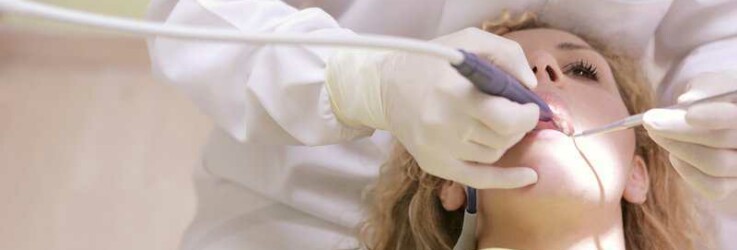Blog
Essential Dental First Aid Items Every Family Should Have

Accidents can happen at any time, and dental emergencies are no exception. But having a well-equipped dental first aid kit at home can make a significant difference in handling unexpected dental issues promptly and effectively. Keep in mind that all dental emergencies should warrant a phone call to your dentist in Douglasville. However, having a specialized dental first aid kit can help you address oral health emergencies with precision before you can get in for an exam.
The Basics of a Dental First Aid Kit
- Gloves
Safety comes first. Disposable gloves ensure that you maintain proper hygiene while administering first aid.
- Gauze Pads and Cotton Balls
These are versatile tools to help stop bleeding, cushion sensitive areas, and clean wounds.
- Dental Mirror
A dental mirror helps you see those hard-to-see areas.
- Dental Floss and Floss Picks
These are essential for dislodging food particles stuck between teeth, which can cause discomfort or even infection.
- Saline Solution
This is useful for rinsing out the mouth, cleansing wounds, and soothing irritation.
- Temporary Dental Filling Material
A temporary filling can temporarily seal a cavity or a broken tooth, providing relief until you can see a dentist.
- Dental Wax
This can be used to cover sharp or jagged edges of a broken tooth, braces, or other dental appliances, preventing further irritation or injury.
- Over-the-Counter Pain Relievers
Pain can be a major concern during dental emergencies, and over-the-counter pain relievers can help. Consult a dentist or healthcare provider about which pain relievers to include in your kit.
- Clove Oil
Known for its natural numbing properties, clove oil can provide temporary relief for toothaches.
- Emergency Dental Contact Information
Keep a list of emergency dental contacts, including your dentist in Douglasville.
Addressing Common Dental Emergencies
- Toothache
A sudden toothache can be agonizing. Rinse your mouth with warm water, use dental floss to dislodge any debris, and apply a cold compress to reduce swelling. Over-the-counter pain relievers may help, but consult your dentist if the pain persists.
- Chipped or Broken Tooth
Rinse your mouth with warm water and collect any tooth fragments. If there’s bleeding, apply gauze with gentle pressure. Cover any sharp edges with dental wax and call your dentist.
- Knocked-Out Tooth
Time is critical here. Handle the tooth by its crown (top), not the roots. Rinse it gently with water and try to place it back into the socket if possible. If that’s not feasible, store it in a container with milk or saliva, and seek dental care immediately.
- Object Stuck Between Teeth
Use dental floss to gently remove the object. Never use sharp or pointed objects that could damage gums.
Every home should have a dental first aid kit. By being prepared to handle dental emergencies promptly, you can alleviate pain, prevent complications, and increase the chances of successful treatment when you’re able to reach a dentist. Remember that while a dental first aid kit is a useful tool, it’s not a substitute for professional dental care. Always consult your Douglasville dentist for proper diagnosis and treatment after administering first aid.
How Good Oral Health May Help Protect Against Alzheimer’s

Maintaining good oral health by brushing, flossing, and seeing your dentist in Douglasville has long been associated with benefits such as a bright smile and fresh breath. However, researchers have been uncovering an even bigger reason to take care of your teeth. Studies continually show a potential connection between oral health and overall well-being, particularly in relation to cognitive health. A growing body of evidence suggests that there might be a link between good oral hygiene and a reduced risk of developing Alzheimer’s disease, a debilitating neurodegenerative disorder. Let’s take a look at how taking care of your teeth and gums might play a role in safeguarding your brain health.
The Oral-Brain Connection
The mouth serves as the gateway to the body, and its health can impact various aspects of overall health, so it’s not surprising that the oral-brain connection has caught the attention of scientists. Poor oral hygiene can lead to the accumulation of harmful bacteria in the mouth, causing gum disease and other oral infections. Interestingly, these oral pathogens don’t just stay confined to the mouth – they can find their way into the bloodstream and potentially reach the brain.
Inflammation and Alzheimer’s
One of the key factors linking oral health and Alzheimer’s disease is inflammation. Chronic inflammation is believed to contribute to the development and progression of various diseases, including Alzheimer’s. Gum disease triggers an inflammatory response in the body, and if left untreated, this inflammation can spread to other parts of the body, including the brain.
Research has shown that the presence of specific oral bacteria associated with gum disease can be detected in the brains of individuals with Alzheimer’s disease. These bacteria might contribute to the formation of beta-amyloid plaques, a hallmark of Alzheimer’s, by activating the immune system and promoting inflammation in the brain. Therefore, maintaining good oral health could potentially help reduce the risk of chronic inflammation and its potential impact on brain health.
The Blood-Brain Barrier
The blood-brain barrier is a protective network of blood vessels that acts as a barrier between the bloodstream and the brain. It prevents harmful substances from entering the brain while allowing essential nutrients to pass through. However, certain infections and inflammatory responses can compromise the integrity of this barrier, potentially allowing harmful agents to reach the brain.
Oral bacteria associated with gum disease can release toxins that may weaken the blood-brain barrier. This weakening can make it easier for harmful substances to enter the brain, triggering an immune response that contributes to inflammation and damage. By maintaining good oral health, you might be able to reduce the risk of these oral bacteria infiltrating the brain and compromising the blood-brain barrier’s function.
Preventive Strategies
While research into the link between oral health and Alzheimer’s is still ongoing, there are several steps you can take to prioritize your oral hygiene and potentially support your cognitive health:
Brush & Floss Regularly: The foundation of good oral hygiene lies in regular brushing and flossing. Brush your teeth at least twice a day with fluoride toothpaste and don’t forget to floss to remove food particles and plaque from between your teeth.
Visit Your Dentist in Douglasville: Regular dental check-ups are essential for detecting and addressing any oral health issues early on. Your dentist can help you maintain healthy gums and catch any signs of gum disease.
Eat A Balanced Diet: A diet rich in fruits, vegetables, lean proteins, and whole grains can contribute to both oral and overall health. Avoid sugary snacks and beverages that can promote tooth decay.
Stay Hydrated: Drinking water helps wash away food particles and bacteria that can lead to plaque formation.
Avoid Smoking & Excessive Alcohol: Smoking and heavy alcohol consumption are linked to increased risk of gum disease and can have negative effects on oral health.
The connection between oral health and cognitive health is an exciting area of research that holds promise for our understanding of neurodegenerative diseases like Alzheimer’s. While more studies are needed to establish a definitive link between good oral hygiene and reduced Alzheimer’s risk, the existing evidence suggests that prioritizing oral health might have more far-reaching benefits than we previously imagined. By taking care of your teeth and gums, you could potentially be taking a proactive step towards protecting your brain health in the long run. So, don’t underestimate the power of a healthy smile or the importance of visits to your dentist in Douglasville – they could be a window to a healthier brain.
Is There Any Cure For Dry Mouth?

Dry mouth is a common, yet often-overlooked, condition that affects millions of people. While dry mouth may seem like no big deal, the truth is it can actually be pretty uncomfortable and could even cause some pretty serious oral health problems. If you’re looking for a cure for dry mouth, your dentist in Douglasville has some suggestions that could alleviate this annoying ailment.
What Is Dry Mouth?
Dry mouth, which is also medically known as xerostomia, is a condition that occurs when there isn’t enough saliva production in the mouth. It can happen to anyone, and while occasional dry mouth may be normal, chronic dryness can lead to a range of uncomfortable symptoms, and affect speech, eating, and even dental health.
What Causes Dry Mouth?
Numerous factors can trigger dry mouth, and understanding the root cause is crucial in determining the best, most effective treatments. Your dentist in Douglasville will evaluate you for some of the most common causes of dry mouth including:
Medications
Certain medications, such as antihistamines, antidepressants, and diuretics, are notorious for causing dry mouth as a side effect.
Medical Conditions
Dry mouth can be a symptom of underlying medical conditions like Sjögren’s syndrome, diabetes, and autoimmune disorders. By understanding the connection between these conditions and dry mouth, we can explore potential cures tailored to each situation.
Lifestyle
External factors like smoking, alcohol consumption, and breathing through the mouth can exacerbate dry mouth symptoms.
The Consequences of Untreated Dry Mouth
The impact of untreated dry mouth goes beyond mere discomfort. For example, dry mouth can have potential consequences on oral health, nutrition, and overall well-being. Understanding these implications underscores the importance of finding viable solutions.
Available Treatments for Dry Mouth
While there might not be a one-size-fits-all cure for dry mouth, various treatments can help alleviate symptoms and improve the quality of life for those affected. Talk to your dentist in Douglasville to determine the best treatment for your dry mouth.
Over-the-Counter Remedies
There’s an array of over-the-counter products specifically designed to combat dry mouth, including mouthwashes, sprays, and lozenges.
Lifestyle Changes
Embracing and making specific lifestyle changes like quitting smoking or limiting alcohol intake can also play a significant role in managing dry mouth.
Prescription Medications
For severe cases of dry mouth, prescription medications may offer more substantial relief.
Dry mouth may be an annoying challenge, but there are things you can try to help cure it. By determining the root cause, exploring available treatments, and making lifestyle changes, relief is within reach. If you or someone you know suffers from dry mouth, start by scheduling an appointment with your dentist in Douglasville.
What Are Some Side Effects Of Dental Procedures?

While dental treatments are often essential for maintaining oral health or achieving a dazzling smile, it’s important to be aware of the possible side effects associated with them. From teeth whitening to dental fillings and root canals, each procedure can come along with its own side effects. So before undergoing any dental treatment, ease your mind by talking with your dentist in Douglasville about potential side effects, what to expect after a procedure, and the best course of action for you.
Cosmetic Dentistry & Teeth Whitening
Cosmetic dentistry has gained popularity over the years, with people seeking various procedures to enhance their smiles. One of the most sought-after treatments is teeth whitening. A bright, pearly white smile can boost confidence, but what are the potential side effects of this procedure?
- Tooth Sensitivity
Teeth whitening often involves the use of bleaching agents that can penetrate the enamel to remove stains. This process can lead to temporary tooth sensitivity, where individuals experience discomfort or pain when consuming hot, cold, sweet, or acidic foods and beverages.
- Gum Irritation
In some cases, the bleaching agents used in teeth whitening can irritate the gums, causing redness and mild discomfort. However, choosing a professional whitening treatment in the comfort of your dentist’s office instead of an at-home product can help minimize the risk of gum irritation during the procedure.
Dental Fillings
Dental fillings are a common treatment for cavities, restoring the structure and function of damaged teeth. Whether you choose traditional silver amalgam fillings or modern tooth-colored fillings, both treatments can have side effects.
- Sensitivity
Patients may experience temporary tooth sensitivity after getting a filling. This sensitivity usually subsides quickly, but it’s essential to be aware of this possibility.
- Discomfort
After your dentist places a filling, they will file it down to match the size, shape, and height of the original area. However, if the filling sits too high, you may experience jaw or tooth discomfort. The solution is easy – just call your dentist in Douglasville for a quick and painless adjustment.
Root Canal Treatment
Root canal treatment is often feared but it’s a necessary procedure to save a severely damaged or infected tooth. While it’s a highly successful treatment, some side effects may occur.
- Post-Treatment Discomfort
After a root canal, patients might experience some discomfort or mild pain, which can usually be managed with over-the-counter pain relievers. This discomfort is temporary and should subside as the tooth heals.
Different dental procedures may be necessary for a variety of different concerns, and we understand that you may feel uneasy about getting treatment. However, taking care of problems early is a crucial part of maintaining oral health. We encourage you to talk with your dentist in Douglasville about the pros and cons, as well as any side effects, of any recommended treatments to ease your mind and make an informed decision.
How To Handle Dental Emergencies

Dental emergencies can occur unexpectedly, causing pain, discomfort, and anxiety. Knowing how to handle these situations promptly and effectively is crucial to minimize pain, prevent further damage, and ensure timely care. In this comprehensive guide, your dentist in Douglasville explores common dental emergencies and provides step-by-step instructions on how to handle them.
Contact Your Dentist
Different types of dental emergencies require different kinds of care, so it’s important to contact your dentist in Douglasville quickly if you experience a dental emergency so they can diagnose and properly treat your specific needs. While there are steps you can take to help reduce the risk of additional damage and temporarily relieve discomfort, you should always let your dentist know if you have a dental emergency.
Toothaches
Toothaches can pop up out of nowhere and can cause mild discomfort or even excruciating pain. Here’s what you can do:
- Rinse your mouth with warm saltwater to alleviate pain and reduce inflammation.
- Gently floss around the affected tooth to remove any trapped food particles that may be causing the pain.
- Take over-the-counter pain relievers as directed, but avoid placing aspirin directly on the tooth or gums.
- Apply a cotton ball soaked with clove oil to the area. Clove oil contains a natural anesthetic and antibacterial that helps reduce inflammation.
Knocked-Out Tooth
If a tooth gets knocked out, immediate action is crucial for the best chance of saving it:
- Handle the tooth by the crown (the top part) and avoid touching the root.
- Rinse the tooth gently with water if it’s dirty, but do not scrub or remove any attached tissues.
- Try to reinsert the tooth into its socket, making sure it’s facing the correct way. Apply gentle pressure to hold it in place.
- If you cannot reinsert the tooth, place it in a container of milk or saliva and seek dental assistance immediately. Time is of the essence when it comes to saving a knocked-out tooth.
Broken or Chipped Tooth
If you break or chip a tooth, follow these steps:
- Rinse your mouth with warm water to clean the area.
- Save any broken pieces of the tooth.
- If there’s bleeding, apply gentle pressure with a clean gauze or cloth.
- Your dentist in Douglasville will evaluate the extent of the damage and recommend the appropriate treatment, which may include dental bonding, a crown, or other restorative dentistry options.
Lost Filling or Crown
Losing a filling or crown can be uncomfortable, but temporary solutions are available:
- Clean the affected tooth and apply dental cement or temporary dental filling material, available at most pharmacies.
- Avoid chewing on the affected side until you can see your dentist for a permanent solution
Soft Tissue Injuries
Injuries to the lips, gums, cheeks, or tongue can result in bleeding and discomfort. Here’s what to do:
- Rinse your mouth with warm saltwater to clean the area.
- Apply gentle pressure with a clean gauze or cloth to control bleeding.
- If bleeding persists or the injury is severe, seek immediate medical attention or visit the emergency room.
Handling dental emergencies requires prompt action and appropriate care. By following the steps outlined in this comprehensive guide, you can effectively manage dental emergencies. However, it’s essential to remember that these steps are temporary measures, and seeking professional dental care from your dentist as soon as possible is crucial for proper diagnosis and treatment.
What Happens If You Don’t Wear a Mouthguard?

Engaging in physical activities without the proper protective gear can have serious consequences. When many people think of protective gear, they often think of things like helmets or shin guards. But one area that’s often overlooked, and one that’s important to your dentist in Douglasville, is the use of mouthguards. However, if you don’t wear a mouthguard during activities that pose a risk of dental injuries, it can increase the risk of long-term damage to your teeth, jaw, and overall oral health.
Dental Injuries & Trauma
One of the most common consequences of not wearing a mouthguard is an increased risk of dental injuries. Activities such as contact sports or recreational hobbies can lead to direct impacts on the mouth, causing broken or chipped teeth, tooth loss, and damage to the soft tissues in the oral cavity. These injuries not only require immediate dental attention but can also lead to long-term dental problems and the need for extensive dental treatments.
Jaw Fractures & TMJ Disorders
The absence of a mouthguard puts the jaw at greater risk of fractures and dislocations. With a mouthguard, the force of any strong impact on the jaw during physical activities would be absorbed by the mouthguard. Without that protection, blows to the jaw can result in severe injuries, leading to pain, difficulty in opening and closing the mouth, and TMJ disorders. These conditions can cause chronic discomfort, limited jaw movement, and problems with eating, speaking, and overall quality of life.
Tooth Movement & Root Damage
Without the protection of a mouthguard, teeth are vulnerable to being moved out of their original positions, changing their appearance. Impacts on the mouth can cause teeth to shift, rotate, or even be pushed into the jawbone. Additionally, the force from an impact can damage the tooth roots, leading to root fractures, nerve damage, and potential tooth loss. Restorative dentistry treatment such as root canals, dental implants, or orthodontic procedures from your dentist in Douglasville may be necessary to repair the damage caused by tooth displacement and root injuries.
Increased Risk of Concussions
Even though the primary purpose of mouthguards is to protect the teeth, they can also help reduce the risk of concussions. The cushioning effect of a mouthguard can absorb some of the impact forces, reducing the transmission of those forces to the head and potentially minimizing the risk of brain injuries. Without this protective barrier, the likelihood of sustaining a concussion increases, which can have both serious short-term and long-term consequences.
Choosing not to wear a mouthguard during physical activities can lead to severe consequences for your oral health and overall health. To protect your smile and safeguard your future, wear a properly fitted mouthguard during any activity that poses a risk to your oral health.
How to Deal with Tooth Sensitivity

Tooth sensitivity is a common dental issue that affects millions of people. It’s characterized by a sharp, sudden pain when eating or drinking hot, cold, sweet, or acidic foods and beverages. Your dentist in Douglasville understands that tooth sensitivity can be a frustrating and painful experience. That’s why we want to share some information about the causes, symptoms, and treatment options for tooth sensitivity.
Causes of Sensitivity
Various different things can cause tooth sensitivity, such as:
- Tooth decay or cavities
- Gum disease
- Enamel erosion
- Grinding or clenching teeth
- Excessive brushing or using a hard-bristled toothbrush
- Certain dental procedures, such as teeth whitening or dental restorations
Symptoms of Sensitivity
The primary symptom of tooth sensitivity is sharp, sudden pain when eating or drinking hot, cold, sweet, or acidic foods and beverages. Some people may also experience pain when brushing or flossing their teeth.
Treatment Options for Tooth Sensitivity
The treatment for tooth sensitivity will depend on the underlying cause. Here are some treatment options that may be recommended by your dentist in Douglasville:
- Desensitizing toothpaste: This type of toothpaste contains compounds that help block the transmission of pain signals from the tooth to the nerve.
- Fluoride treatment: Fluoride can help strengthen tooth enamel and reduce sensitivity.
- Dental restoration: If tooth decay or a damaged filling is the cause of sensitivity, a dental restoration may be recommended.
- Root canal: In severe cases of tooth sensitivity, a root canal may be necessary to remove the damaged or infected tooth pulp.
Preventing Tooth Sensitivity
Prevention is the best way to deal with tooth sensitivity. Here are some tips to help prevent tooth sensitivity:
- Practice good oral hygiene: Brush your teeth twice a day with a soft-bristled toothbrush and floss daily to remove plaque and prevent gum disease.
- Use fluoride toothpaste: This can help strengthen tooth enamel and reduce sensitivity.
- Limit acidic foods and beverages: Acidic foods and beverages can erode tooth enamel and increase sensitivity.
- Wear a mouthguard: If you grind or clench your teeth, wearing a mouthguard can help protect your teeth from damage.
Tooth sensitivity can greatly impact your daily life. That’s why we encourage anyone experiencing sensitivity to schedule an appointment with a dentist in Douglasville. They can offer personalized treatment options to help you manage your tooth sensitivity and enjoy your favorite foods and drinks without pain.
Don’t let tooth sensitivity impact your daily life. Schedule an appointment with us today.
Why Are Regular Teeth Cleanings Important?

You’ve heard your dentist in Douglasville say time and time again just how important regular teeth cleanings are to maintaining good oral health. It’s true! Routine dental checkups and cleanings are critical to preventing dental problems, catching any problems early when they’re easier to treat, and maintaining overall health.
Decay & Gum Disease
Firstly, regular teeth cleanings help prevent tooth decay and gum disease, which are two of the most common dental problems. Plaque buildup is the leading cause of tooth decay and gum disease, and unfortunately, it can be difficult to remove through brushing and flossing alone. Professional teeth cleanings with your dentist in Douglasville remove plaque and tartar buildup, significantly reducing the risk of dental problems. By attending regular teeth cleanings, you can prevent cavities, tooth loss, and gum disease, saving you money and time in the long run.
Oral Health is Linked to Overall Health
Additionally, regular teeth cleanings can also prevent other health problems. Recent studies have shown that oral health is connected to overall health, and poor dental hygiene can lead to serious health issues such as heart disease, stroke, and diabetes. By keeping up with regular teeth cleanings, you are not only taking care of your oral health but also contributing to your overall well-being.
More Than a Cleaning
It’s important to remember that dental cleanings are not just about cleaning your teeth. During your visit, your dentist in Douglasville will also conduct oral cancer screenings, check for signs of other dental problems such as gingivitis and periodontitis, and provide you with personalized advice on how to maintain optimal oral health. By attending regular teeth cleanings, you can catch potential dental problems early and take preventative action, improving your overall health.
Even patients with the most diligent at-home dental care routine need to see their dentist at least every six months because plaque can still build up in hard-to-reach areas of your mouth. Only professional teeth cleanings can thoroughly remove plaque and tartar buildup, helping you avoid costly and painful dental problems.
By attending regular teeth cleanings at our practice, you can enjoy a brighter, healthier smile and peace of mind knowing that you are taking the necessary steps to protect your oral and overall health.
5 Things That Can Harm Teeth

If you’re following an excellent oral health routine of brushing and flossing every day and seeing your dentist in Douglasville twice a year but still find yourself getting cavities, having tooth sensitivity, or needing dental restorations to help fix damaged teeth, other things may be to blame. The truth is, there are habits that many people do every day that can harm teeth.
- Chewing Ice, Nails, and Other Things
Many people find comfort in chewing ice, biting their nails, or nibbling on other things such as pens or pencils. However, gnawing on these comfort items can cause some serious oral health problems. Chewing on ice, biting your nails, or gnawing on pens can lead to broken or chipped teeth that will need to be fixed by your dentist in Douglasville. But these habits can also create tiny tooth fractures over time that you may not notice, until they turn into big cracks and potentially cause pain. Additionally, nail biting could also cause teeth to shift or place pressure on the jaw, causing pain.
- Opening or Holding Packages with Your Teeth
Teeth were designed for two reasons – to help us chew and to help us speak. They were not designed to open pesky packages or hold things that don’t fit into our hands. Using teeth for things other than what they’re meant to do could damage teeth. Some common problems associated with using teeth as tools are broken teeth, cracked teeth, broken restoration, or trauma to the soft tissues in the mouth.
- Using Too Much Force While Brushing
A common misconception is that you have to brush hard in order to really clean your teeth. However, the truth is, if you use too much force while brushing your teeth, you could actually cause harm. Brushing your teeth too hard could lead to an increased risk of decay, damage, and sensitivity. Always choose a toothbrush with soft bristles and gently move the brush over each tooth.
- Clenching or Grinding Your Teeth
Many people clench or grind their teeth in times of stress. This habit is often done subconsciously and we don’t even know we’re doing it. But there may be signs that you’re clenching or grinding your teeth, perhaps while you’re asleep. Consistent grinding or clenching can make teeth appear short and worn down. It can also cause tooth damage such as chips, breaks, or cracks. One of the most common signs of clenching or grinding is jaw pain, so make sure to mention any symptoms of TMJ to your dentist in Douglasville.
- Smoking or Using Chewing Tobacco
Tobacco use not only affects overall health, it can also negatively affect oral health. On the surface, smoking cigarettes or cigars or using chewing tobacco can cause tooth discoloration. But the concerns go much deeper. Using any type of tobacco can increase the risk of tooth decay, gum disease, tooth loss, and oral cancer.
We will always encourage our patients to brush and floss every day to help keep their mouths healthy. We also encourage our patients to be honest with us about any habits that may affect oral health. Afterall, it will only help us provide better, more personalized care.
What Asthmatics Need to Know About Their Oral Health

May is Asthma Awareness Month, which makes it a great time to educate people on this very common, yet very serious, disease. Around 25 million Americans, both children, and adults, have asthma, and it can’t be cured. While asthma predominantly affects the respiratory system and can cause shortness of breath, wheezing, coughing, and chest tightness, your dentist in Douglasville wants all asthmatics to know that it can also affect oral health.
Asthma & Oral Health
Even though asthma can’t be cured, the good news is that it can often be treated. Many asthma sufferers will use inhalers to help control their asthma symptoms, but other medications also exist. It’s there where oral health problems related to asthma begin.
- Dry Mouth
Inhalers and other asthma treatments can cause dry mouth. Dry mouth is an oral health condition that can be uncomfortable, but the truth is, it could also cause some dental concerns. When there’s not enough saliva in your mouth, bacteria and acids that would typically be washed away will hang around and attack teeth. This can weaken tooth enamel and increase the risk of decay, cavities, bad breath, and gum disease. Anyone experiencing dry mouth, whether they’re asthmatic or not, should talk to their dentist in Douglasville.
- Mouth Breathing
Another concern that often affects those with asthma is mouth breathing. When we have trouble breathing, we will automatically start breathing out of the mouth instead of the nose. Since asthmatics typically have more difficulty breathing than those without asthma, they are more likely to breathe out of their mouths to get the oxygen they need. However, mouth breathing can quickly cause dry mouth. So not only are asthmatics more likely to experience dry mouth due to medications, but regular mouth breathing also increases the risk.
How to Fix Dry Mouth
Dry mouth can leave us feeling constantly thirsty, and it is just simply uncomfortable. But the good news is that there are some tried and true tricks that can help alleviate dry mouth.
- Stay Hydrated. Those with dry mouths may already drink more water throughout the day. This is important. Drinking plenty of water throughout the day helps keep the mouth hydrated, which will more effectively wash away bacteria and neutralize damaging acids.
- Rinse With Water. After taking asthma medication, a quick rinse with water will help remove the drying ingredients, lowering the risk of dry mouth.
- Talk to Your Dentist. It’s important to communicate any health conditions to your dentist in Douglasville.
- . Knowing your health history helps your dental team customize treatment for you and notifies them to be on the lookout for any oral health concerns that may result from other health problems in the rest of the body.
As always, never stop any medication without first talking to your physician, brush and floss your teeth every day, and visit your dentist at least every six months for cleanings, dental x-rays, and checkups.
